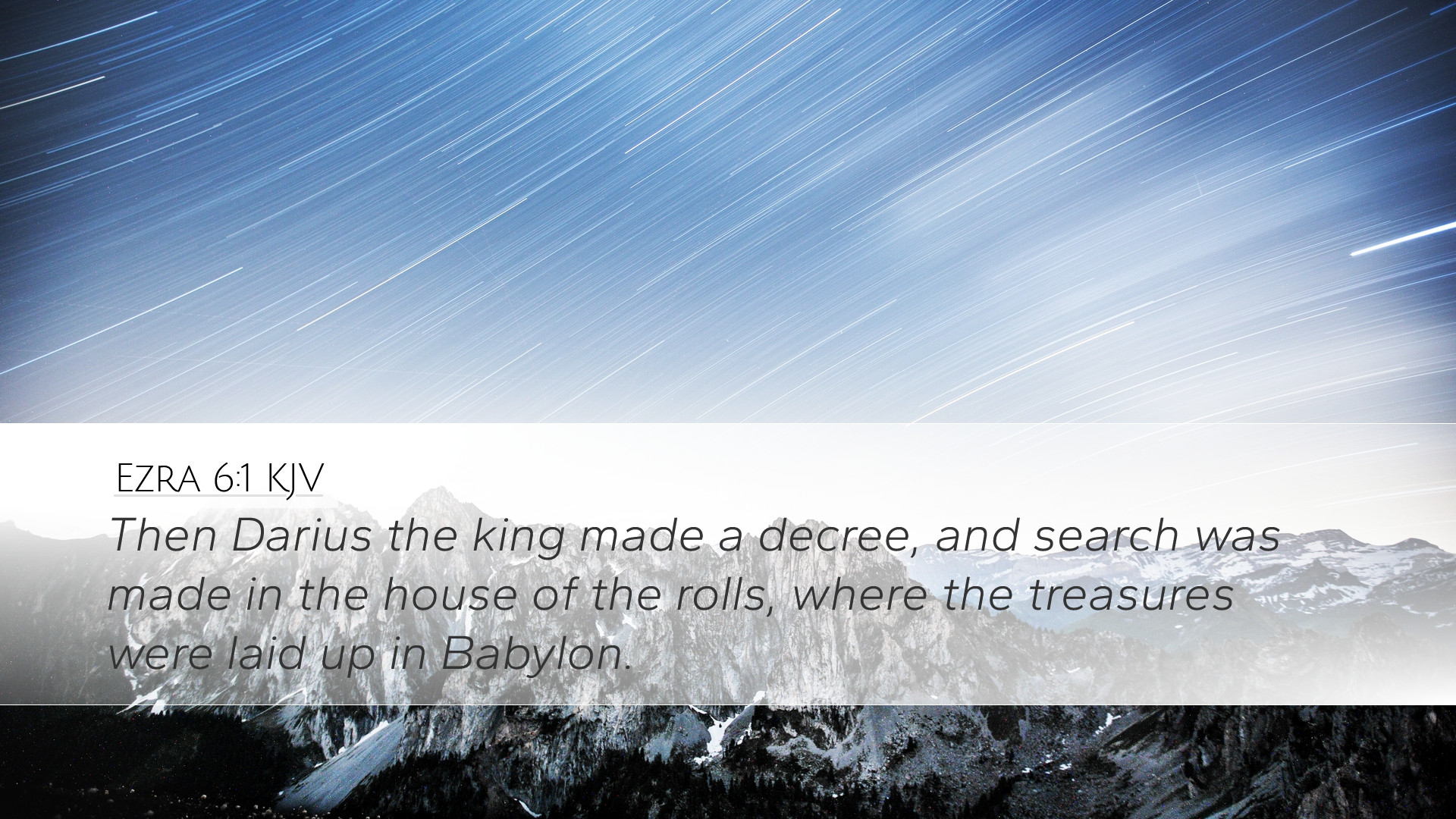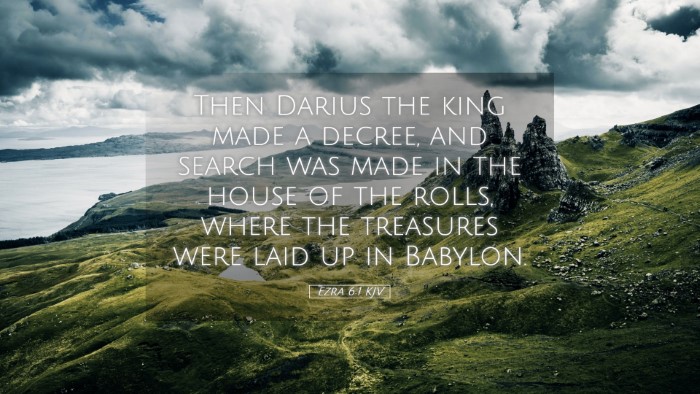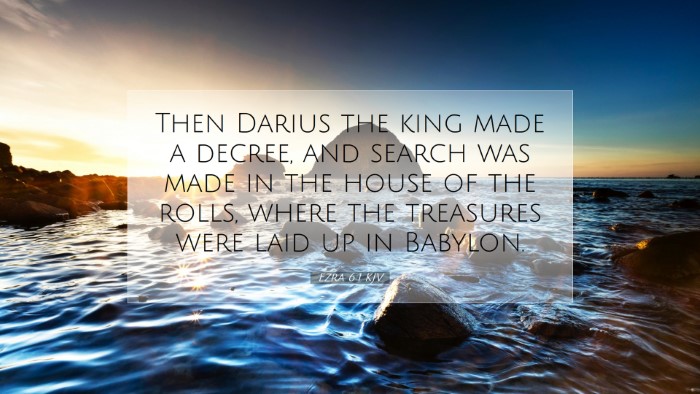Old Testament
Genesis Exodus Leviticus Numbers Deuteronomy Joshua Judges Ruth 1 Samuel 2 Samuel 1 Kings 2 Kings 1 Chronicles 2 Chronicles Ezra Nehemiah Esther Job Psalms Proverbs Ecclesiastes Song of Solomon Isaiah Jeremiah Lamentations Ezekiel Daniel Hosea Joel Amos Obadiah Jonah Micah Nahum Habakkuk Zephaniah Haggai Zechariah MalachiEzra 6:1
Ezra 6:1 KJV
Then Darius the king made a decree, and search was made in the house of the rolls, where the treasures were laid up in Babylon.
Ezra 6:1 Bible Commentary
Ezra 6:1 - Commentary and Insights
Verse: "Then Darius the king made a decree, and search was made in the house of the rolls, where the treasures were laid up in Babylon."
Introduction
The context of Ezra 6:1 occurs during the reign of King Darius of Persia, as the Jewish exiles are returning to Jerusalem to rebuild the temple. This verse marks a pivotal moment in the surrounding narrative, as it demonstrates the political and bureaucratic processes involved in supporting the restoration of God's people.
Commentary from Matthew Henry
Matthew Henry emphasizes the providence of God in influencing King Darius to investigate the records concerning the decree of Cyrus. He highlights that it is crucial for believers to remember that God's hand is at work even in secular governance. The search for the records signifies a turning point in the efforts to restore the temple and provides assurance to the Israelites that God’s promises are being fulfilled.
- God's Guidance: Henry suggests that the investigation reflects God’s continual guidance over earthly kings, positioning them as instruments to fulfill His divine purposes.
- Historical Accuracy: The mention of "the house of the rolls" emphasizes the importance of historical records and how they validate the Jewish community's claims about the temple's construction order.
Insights from Albert Barnes
Albert Barnes provides a theological lens through which the verse can be understood. He contemplates the significance of Darius’s decree and its implications for the Jewish people.
- Sovereignty of God: Barnes notes that the decree showcases God’s sovereignty not only in the spiritual realm but also in political matters, giving rise to favorable circumstances for the Jews. The search for documents proves the legitimacy of their situation.
- The Role of Governance: Barnes further argues that this incident shows how God can use even unwitting rulers to aid in the pursuit of His goals, reminding the reader of divine orchestrations in history.
Analysis from Adam Clarke
Adam Clarke offers a comprehensive investigation into the socio-political aspects surrounding Ezra 6:1. He delves into the implications of the king's decree as it pertains to bureaucratic processes of the time.
- Search for Records: Clarke explains that the “house of the rolls” refers to a specific repository of official documents which played a crucial role in validating claims such as those by the Jewish people regarding their right to rebuild the temple.
- Political Context: He outlines the significance of Darius’s actions within the broader context of Persian governance, noting that such decrees were essential for maintaining stability and order within the empire.
Theological Implications
Ezra 6:1 serves as a profound reminder of the interaction between divine providence and human affairs. The insights drawn from the commentaries reveal how God’s plan unfolds through the actions of rulers and the commitment of His people.
1. Divine Providence
The sovereign hand of God is evident as He influences Darius’s heart to search the records, evidencing that nothing occurs outside of His sovereignty. This theme resonates throughout Scripture, affirming the belief that God directs the hearts of kings.
2. Importance of Historical Record
This verse highlights the necessity of preserving history and records as a means of affirming truth and claiming rights. The retrieval of Cyrus's decree is vital for the Jews to restore their temple, illustrating the importance of documentation in faith practices today.
3. Encouragement for Believers
Believers can draw strength from this narrative, understanding that even when circumstances appear unfavorable or hopeless, God is orchestrating events for their eventual restoration and hope. Darius's decree is a symbol of God's promise coming to fruition, calling believers to trust in His timing and methods.
Conclusion
Ezra 6:1 encapsulates a moment of divine orchestration in the lives of the Jewish exiles. The insights from the commentaries by Matthew Henry, Albert Barnes, and Adam Clarke paint a rich tapestry of theological meaning and practical application. This verse not only serves as a historical account but also as an enduring reminder of God's faithful provision amidst the complexities of life. As pastors, students, theologians, and scholars reflect on this passage, may they find renewed confidence in God's sovereignty and the unwavering promise He extends to His people.


